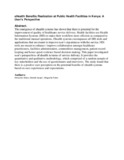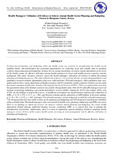| dc.contributor.author | Wasike, Hedwick N. | |
| dc.date.accessioned | 2017-11-23T09:01:43Z | |
| dc.date.available | 2017-11-23T09:01:43Z | |
| dc.date.issued | 2017-11 | |
| dc.identifier.uri | http://r-library.mmust.ac.ke/123456789/270 | |
| dc.description.abstract | Adolescents are more than one billion worldwide and more than 75% are found in
developing countries and frequently engage in risky sexual behaviors, which result in
unprotected sex, unwanted pregnancy, sexually transmitted infections including HIV
and AIDS, unsafe abortions and other reproductive health problems that are the
greatest risk to their well-being. In Kenya, inadequate access by adolescents to
reproductive health information is one of the key barriers to improved sexual and
reproductive well-being and quality of life. However, there is scanty information in
Sirisia sub-county on barriers of parent adolescent communication. The broad
objective of the study was to evaluate parent- adolescent communication on sexual and
reproductive health among secondary school students. Specific objectives of the study
were to: determine the level of knowledge of parents and adolescents towards sexual
and reproductive health, determine the source of information for adolescent
communication on sexual and reproductive health and analyze the factors affecting
parent-adolescent communication. This study was guided by a conceptual framework
developed by the researcher where by independent variables were level of knowledge,
source of information and dependent variable was SRH issues. The study adopted
cross sectional research design. The study population was 8547 secondary students.
The sample size of the study was made up of 697 secondary students, 29 teachers and
48 parents. Purposive sampling was used to select parents and teachers. Cluster
sampling was used to select sample size of 697 students using Fisher’s formulae. Data
was collected using structured questionnaire, interview guide and focus group
discussion. Piloting of the research instruments was done in Webuye West sub-county
to validate and to make research instruments reliable. The reliability coefficient for the
questionnaire was 0.75, for interview was 0.78 and for FGD was 0.81. The findings
indicate that parent-adolescent communication on sexual and reproductive health in
Sirisia Sub County was that level of education of parents influenced adolescent’s
perceived knowledge level. Those whose fathers had no education or had attained
primary education were 60% less likely to be knowledgeable than those whose parents
had secondary or tertiary education (OR: 0.4; 95% CI: 0.3 – 0.6; p < 0.0001), the main
source of adolescent SRH information was found to be from peers (OR: 6.6; 95% CI:
3.1 – 13.9; p <0.0001). Cultural norms and fear of discussion are the major factors that
affect communication. (OR: 0.2; 95% CI: 0.01 – 0.82; p =0.009) (OR: 0.2; 95% CI:
0.1 – 08; p =0.01). This study will assist secondary school stakeholders, education
policy makers and provide extensive knowledge about parent-adolescent
communication on SRH issues. Similarly, it will affect paramedics to understand
sexual behavioral patterns of the adolescents in the society. The study
recommendations include; there should be deliberate efforts made between the parents
and adolescents to bridge the cultural & generational communication barriers as
identified in the study. There should be proper & flexible channels of communication
between parents & adolescents that guarantees the credibility of information shared&
efforts should also be made to ensure that communication on SRH between parents,
teachers and adolescents are enhanced. Efforts must equally be made to enhance
literacy among the parents to ensure that communication between adolescents and the
parents on SRH issues are improved. | en_US |
| dc.description.sponsorship | School of Nursing, Midwifery and Paramedical Sciences | en_US |
| dc.publisher | MMUST | en_US |
| dc.subject | Adolescents | en_US |
| dc.subject | AIDS | en_US |
| dc.subject | Global School-based Student Health Survey | en_US |
| dc.subject | Sexual Reproductive Health | en_US |
| dc.subject | Centre for Adolescent Studies | en_US |
| dc.subject | Global School-based Student Health Survey | en_US |
| dc.subject | Family Planning | en_US |
| dc.subject | Kenya Demographic Health Survey | en_US |
| dc.subject | Sub-Saharan Africa | en_US |
| dc.title | PARENT-ADOLESCENT COMMUNICATION ON SEXUAL AND REPRODUCTIVE HEALTH AMONG SECONDARY SCHOOL STUDENTS IN SIRISIA SUB-COUNTY, KENYA | en_US |



